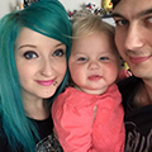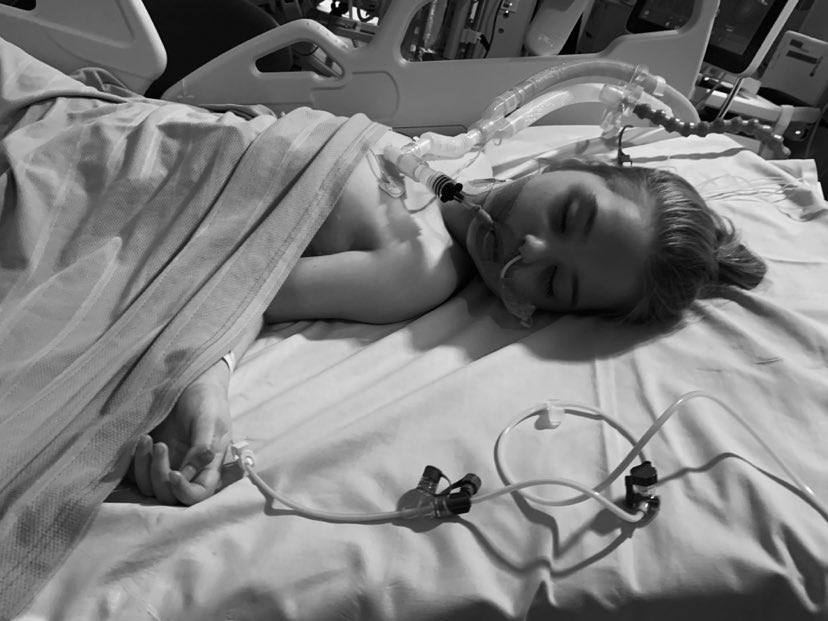PTSD in Parent Carers - Our First PICU Stay

Ceri-Ann Brown
My name is Ceri-Ann Brown and I live in Stockport, Manchester. I live with the love of my life Phil, my amazing daughter (Amy-Rose) and my giant guine...

Parent carers are under-represented. Particularly parent carers of medically complex and/or poorly children.
I still grapple with the term “carer” because your child is your child, and you do what you need to do in order to maximise their health and ensure they lead an enriched life. However, one must recognise that parent carers often go way beyond the call of duty that is usually required of a parent and thus the carer element has to be factored in.
PTSD is rife in our community, there is no denying it. So often PTSD is spoken about in relation to war, or survival from a traumatic accident. But PTSD can arise from many different scenarios and can manifest itself in many different ways.
I have encountered things over the last month that will stay with me to my grave. Images engraved and embedded into the very depths of my soul.
I wanted to share with you all our most recent experience in hospital. PICU.
Medically complex as Amy is, we have managed, until recently, to not require the HDU (High Dependency Unit) or the PICU (Paediatric Intensive Care).
Many readers may already be familiar with our journey but to fill you in - Amy has cerebral palsy and epilepsy induced by hypoxia at birth. She is prone to regular chest infections and has several admissions to hospital per year due to her lungs.
November 27th, 2022. We are called to pick Amy up from respite as she is inexplicably “not herself”. I arrive hoping it will be a quick visit to our local hospital. A course of oral antibiotics, hey maybe we will even avoid needing to stay in! Maybe she won’t need oxygen. We’ll manage this one from home, we don’t want to be in hospital over Christmas thank you very much!
We arrive at respite to a lethargic, unresponsive, floppy Amy. We get to hospital. Oxygen needed immediately. We aren’t going home today.
Fast forward a few days - we are seeing no improvement.
Surely by now the antibiotics should be doing their thing? After a few days we agree to change antibiotics. We have no swab results yet so we are treating this blindly right now with broad spectrum antibiotics.
I wake up one morning and Amy is highly distressed. Like never before. Something isn’t right.
I notice her gastric drainage bag is full of blood. Coffee ground bloods. Loads of it. I panic, telling myself this is maybe just gastric irritation, I’m sure it’s fine. I know in my gut she is not fine. But I need to stay positive.
Things take a turn for the worst and we are promptly moved onto HDU. I am grateful for the extra medical support. I am grateful of the company. But I am terrified.
I’m like a duck swimming. On the surface all is calm and collected. Beneath the surface I am scrambling, frantically pedalling and kicking. My head is booming, I feel sick to my stomach. Please get better soon.
From hereon I kid you not, I witnessed at least 20 cannulas.
They go stiff, they break and fail, they get knocked out. There would be days I would plead “do we really need another cannula? We can’t keep doing this. It isn’t fair.”
Initially Amy would fight it and try to stop the cannulas going in. As the days went by I saw the fights get weaker and less frequent. She became despondent.
She had accepted this new life of “torture”. A constant onslaught of needles, tubes, wires, chest physio, suction, nebs. It was physically and mentally exhausting. With each new tube and wire added I could see less and less of my little girl.
It didn’t stop there. Things got worse. She started to have episodes of bronchospasms. Which I had never even heard of prior to this. It was utterly terrifying.
You know those moments when the room suddenly fills with doctors and nurses and you are sort of shuffled to the side to let them do their work? “Are you okay there mum?”, “I’m scared. I’m so scared” I whimper through tears. But this moment wasn’t about us. It was about Amy.
We watched as adrenaline and goodness knows what was administered. What on earth was happening? Are we losing her? What does it mean?
Phil and I had noted a big change in Amy.
The seizures had ramped up, she was on the absolute full whack airvo (humidified oxygen), her numbers weren’t improving, she was on her maybe 4th or 5th antibiotic. They started Amy on the “dettol of antibiotics” and IV meds to help open her airways. I was fully out of my element. Every term and medication I heard mentioned, I kept a note of and researched in desperation to understand what was happening.
We pleaded with doctors to send us to the city hospital. Our local hospital is fantastic. But we had outgrown what they were able to provide. She was on the maximum of everything, teetering precariously between life and death.
I had mentioned several times that Amy’s heart rate was low. Oh the hours I spent looking at those monitors just willing and hoping for those numbers to magically improve. As if my stare alone would make this all okay.
“She’s just exhausted mum” I was told several times. They were right - she was exhausted. But as parents we have that gut instinct. We just know. I have a huge respect for doctors, but there is also a huge respect that needs to be given to parents that have that personal insight and intuition.
The heart rate drops further.
I call for the doctor. She agrees yes, we need a controlled intubation and a central line. This means city hospital. Hospitals in December often operate at full capacity. This wasn’t going to be easy.
She gave Amy a check over and as she listened to her heart; it dropped further.
“She’s going into cardiac arrest. Time for plan B”. I will always remember those words.
Immediately I was transported to her birth 9 years ago. She had been born with no heart rate, causing a huge brain injury.
Fast forward a few hours… a lot of pacing silently, a lot of sitting feeling sick, a lot of staring emptily into the void at generic artwork on hospital walls in a waiting room. The doctor enters. “She is ventilated, intubated, and stable, do you want to come and see her?”
We entered the theater. Anaesthetists and surgeons look at us with kind eyes and explain what’s happening. “Do you have any questions?” they asked. “No” I choked out. “I just think you’re all amazing. Thank you so much.”
Eventually we are transferred to the city hospital.
I am bundled once again into a waiting room whilst they handover and insert a chest drain.
I come to learn that Amy’s lung is “consolidated”, “pleural effusion”, “a total whiteout”, “collapsed”, “filled with fluid.” “A tear in the lung tissue.”
The wait in those rooms feels like an eternity.
I go to see her. There are more tubes and wires than ever before. I am scared to touch her. It reminds me of her being a baby. I don’t want to disrupt the nurses who so expertly manage her needs.
In spite of being in an induced coma, Amy refused to sleep! She was given so many extra boluses of sedatives. It was so distressing to see as she dystonically tried to wake and pull her breathing tube out. Her skin was puffy with fluid retention. Her breathing so mechanical and frightening to watch.
Every night was spent absolutely exhausted but unable to sleep.
Day by day she started to recover
The chest drain had worked. In spite of not properly resting, she had rested enough to help her lungs heal.
Fast forward to now. Amy is fully recovered. She has finished a 4 week course of antibiotics. She is adjusting back to normality.
I look at her now, so full of life; and I can’t believe she was that same person I saw in PICU attached to all of those machines.
PICU never leaves you. You move on, and slowly day to day normality sets in and now your biggest problems are back to what they previously were - gastro issues, admin, appointments, meds, seizures, lack of sleep and so on.
I have to stop every now and then and breathe and take stock. I honestly thought she was going to die.
We still don’t know what caused this particular episode. I live in fear that it will happen again. I have become hypervigilant, paranoid, scared, desperate. But I have also learnt so much.
Not just medically, but I have learned the power of instinct, I have learned that much more support is needed for families affected by PICU/HDU admissions and traumatic encounters.
I know that in the wider scheme of things we are so lucky.
There are people who are regulars at the PICU, or that have been there for a very long time.
We were home before Christmas. And whilst things were still quite turbulent and we did return to hospital a few times; I couldn’t help but think of the other families there we left behind. The things they were having to see and hear, the uncertainty, the blind panic, the exhaustion, the hopelessness, the loneliness.
Lost souls wandering the corridor, muscles aching to the core, hungry but unable to eat, feeling selfish for every nice thing you get to do such as drink a coffee when really your child is suffering.
We are resilient, strong, amazing. Us, our children, and those that work with us to keep them alive. A huge thank you to our NHS, to RMCH, to Stepping Hill, to Dr Stannard, to NWTs, to everyone involved in saving Amy’s life. A thanks to our incredible friends and family who rallied round us doing whatever they could to soften the blow of the whole ordeal.
Please, if you are suffering with PTSD, seek help.
Your doctor, relevant social media forums, friends and family. Help and support is out there. Share your experiences, find safe ways to try and heal.
Whilst I don't think that light ever switches off; it can dim.
I have loved the work of Jo Griffin at Affinity Hub and also her book - there are some useful resources and information available on her site, and she is a fellow firefly blogger too. Can you believe in my research of PTSD in parent carers the main things that came up were all via Firefly and Joanne?
I wish you all good health.


